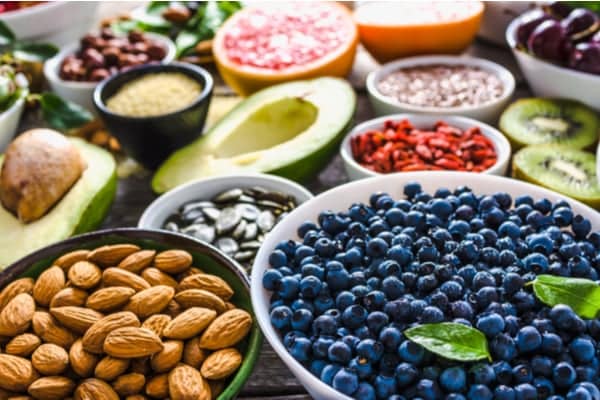Gut health is a hot topic in the health, nutrition, medical, and wellness communities. The amount of research conducted on gut health has mushroomed in the past two decades, and we have learned and confirmed that the gut is intimately connected to hundreds of bodily functions.
As we learn more, there is a greater interest in figuring out how to take better care of our gut. Unfortunately, there is also a lot of misinformation about gut health, giving rise to inaccurate beliefs or myths.
This article dispels eight of the most common gut health myths and provides you with an explanation as to why the statements are inaccurate.
Myth: Gut Health Is Only About Digestive Health
Fact: Gut health impacts all dimensions of health and wellness.
The body does not operate as if it were a puzzle where separate, defined units come together to form a whole. Instead, the body is a complex, integrated ecosystem. Symptoms that appear in one part of the body may result from imbalances in an entirely different bodily system.
Everything in the body is connected. The center of that connection is the gut. It is the system that digests and absorbs the nutrients that are required to survive, it forms a protective barrier, and it hosts the gut microbiome, or the population of microbes in the gut. The gut microbiome not only produces vitamins, beneficial nutrients, and molecules that sustain the body but also controls digestion, metabolism, inflammation, and even cancer risk. When the balance of microbial species in the gut is optimal, the ecosystem works for your health. This is because your wellness is linked to the health of your gut’s “good bugs”. The gut impacts everything from immunity to brain health.
Optimizing gut function, even when individuals do not complain of digestive problems, could help people with diverse and complex health issues be and feel healthier.

Get Your Free Guide to the Top 50 Anti-Inflammatory Foods
Myth: With Leaky Gut, Food Particles Enter Your Bloodstream
Fact: Increased intestinal permeability, sometimes known as “leaky gut syndrome,” may allow toxins, unwanted bacterial metabolites, bacterial components, and, potentially, entire bacteria to enter the bloodstream.
All healthy intestines are semi-permeable. The mucosal layer of the lining of the intestine absorbs water and nutrients from food, as well as metabolites and other chemicals from gut microbiota. But, as a result of inflammation or infection, some people have increased permeability.
Popular perceptions of intestinal permeability may lead people to believe that increased permeability means that big food particles move through the gut freely and into the blood. However, the problem with increased intestinal permeability isn’t that intact substances pass through large “gaps” in the lining of the gut. Instead, it is the breakdown or alternation of the mucosal barrier and intercellular barrier, and altered expression of cellular transport mechanisms.
While more research is needed to understand what substances pass through an impaired mucosal barrier, initial research shows that microbial parts and metabolites that would normally not go through the mucosal and cellular barrier pass through, giving rise to inflammation. Theories also suggest that entire bacteria potentially pass through to colonize other parts of the body through a mechanism called bacterial translocation.
Myth: Probiotics Solve All Gut Health Issues
Fact: Probiotics can help to reestablish a healthy gut microbiome, but lifestyle changes are needed to heal the gut and prevent gut health problems.
Probiotics are symbiotic bacteria that provide a benefit to the host by making vitamins and regulating immune function. Probiotics confer health benefits by similar mechanisms as commensal microbes, which refers to the population of harmonious bacteria in the gut. Probiotics can support gut health and healing by helping to reestablish a healthy gut microbiome. However, diet, exercise, drug consumption, and daily stress all influence your gut microbiome and overall health. So, lifestyle factors also need to be examined to improve gut health. Gut health, and thus whole-body health, is optimized when flora and function are addressed through:
- A balanced diet with anti-inflammatory foods and nutrients that repair the gut lining
- Increased fiber intake
- Enzyme therapy
- Direct treatment of pathogenic flora (“bad bugs”) with herbs and medication
- Exercise and physical activity
- And yes, probiotic supplementation if there is a suspected or proven imbalance of gut bacteria
Myth: Supplements Are Necessary for Gut Health
Fact: If you have a diet that meets your nutrient needs, you do not need supplements.
Generally speaking, everyone should be able to get all of the nutrients they need through their diet. The purpose of a balanced diet is to ensure that you get the right nutrients in the right amounts Deficiencies can be avoided with proper nutrition.
Keeping that in mind, many people have some sort of nutrient deficiency and do not know it. The most common deficiencies in adults in the US are vitamin B6, iron, vitamin D, vitamin C, and vitamin B12. Some nutrient deficiencies have severe implications for gut health, so the first line of action is to improve the diet to meet those nutrient needs. If needs cannot be met with diet, for some reason or another, supplementation is appropriate.
Myth: Fermented Foods Are as Effective as Probiotics
Fact: While some fermented foods may be considered probiotic candidates, not all fermented foods contain probiotics, and the bacteria in probiotic foods may not survive digestion.
Some probiotic strains have been clinically shown to benefit human health. Names of some of these probiotic strains include Lactobacillus, Bifidobacterium, Bacillus, Pediococcus, and several yeasts.
Not all fermented foods contain probiotic strains in quantities needed to have a beneficial effect. Many fermented foods do have health benefits; yogurt, for example, has been shown to help treat antibiotic-induced diarrhea, and maternal intake of Japanese fermented soybean, called natto, can help reduce the risk of eczema in children.
Myth: Grains Are Bad for Your Gut
Fact: Your gut microbiome benefits from many of the nutrients in grains, including fiber and polysaccharides.
Insoluble fibers from whole grains are a form of prebiotics. Prebiotics are “food” for beneficial gut microbes. In fact, your microbiome metabolizes fiber from foods such as whole grains into substances that are beneficial to the body.
Additionally, whole grains contain carbohydrates that can be easily converted to glucose to fuel your gut’s cells, vitamins, and minerals.
What is not beneficial to the gut, however, are refined grains. Refined grains have been stripped of most of the soluble fiber that benefits the gut microbiome.
Keep in mind that people with celiac disease or gluten and wheat sensitivities should not consume wheat or gluten-containing grains. Instead, they should opt for non-gluten-containing grains such as amaranth, arrowroot, buckwheat, corn, flax, and millet.
Myth: Commercial Detox Products Are Needed to Cleanse Your Body of Toxins
Fact: Only the liver can filter toxins from the blood.
Contrary to what many money-making schemes want you to think, no magic smoothies or drinks can directly remove toxins from your body. The organs responsible for filtering out and removing toxins from the blood are the liverand, to a lesser extent, the kidneys. Dietary choices and supplements do, however, support the organs in the body to do their jobs.
Food and food componentscan affect the efficiency with which the liver detoxifies. Fruits and vegetables, for example, contain nutrients that the liver needs for detoxification pathways. Additionally, polyphenols in foods such as red wine, green tea, turmeric, ginger, and spices help neutralize potentially toxic free radicals in the blood before they get to the liver.
Myth: You Can Only Fix Gut Health Problems with Medicine
Fact: Many health problems that originate in the gut can be prevented and treated with diet and lifestyle.
Gut health problems are often a result of lifestyle factors, such as inadequate diet, a sedentary lifestyle , smoking or taking drugs, and chronic stress.
In fact, some medications, such as antibiotics, may initiate health problems that did not exist before.
Keep in mind that some gut health problems, including infections, appendicitis, and cancers in the gut, require medical intervention. A health professional should supervise all gut health healing approaches, whether drug-related or not.
Main Takeaways
The gut includes all the body parts and organs involved with taking in and expelling the foods we eat, including the mouth, esophagus, stomach, small intestine, pancreas, liver, gallbladder, colon, and rectum.
When we talk about gut health, we’re also talking about the gut microbiome, meaning the trillions of good and bad bacteria that live there. This includes the relationship the rest of the body has with the gut microbiome, the role the gut plays in immune function, the communication channels between the gut and the brain, and its impact on overall wellness.
To truly care for the gut, it is vital that we discern myths from facts.

Get Your Free Guide to the Top 50 Anti-Inflammatory Foods
References
- https://www.mdpi.com/2076-2607/8/10/1587
- https://www.mdpi.com/2039-7283/7/4/987
- https://www.ncbi.nlm.nih.gov/pmc/articles/PMC4748908/
- https://www.nature.com/articles/mi2016128
- https://www.mdpi.com/2073-4409/9/8/1909
- https://www.hopkinsmedicine.org/health/conditions-and-diseases/liver-anatomy-and-functions
- https://www.nature.com/articles/nrgastro.2015.47
- https://www.ncbi.nlm.nih.gov/pmc/articles/PMC8588917/
- https://www.sciencedirect.com/science/article/abs/pii/S0899900714005139
- https://www.sciencedirect.com/science/article/pii/S132389301530040X
- https://www.mdpi.com/2072-6643/7/1/17



